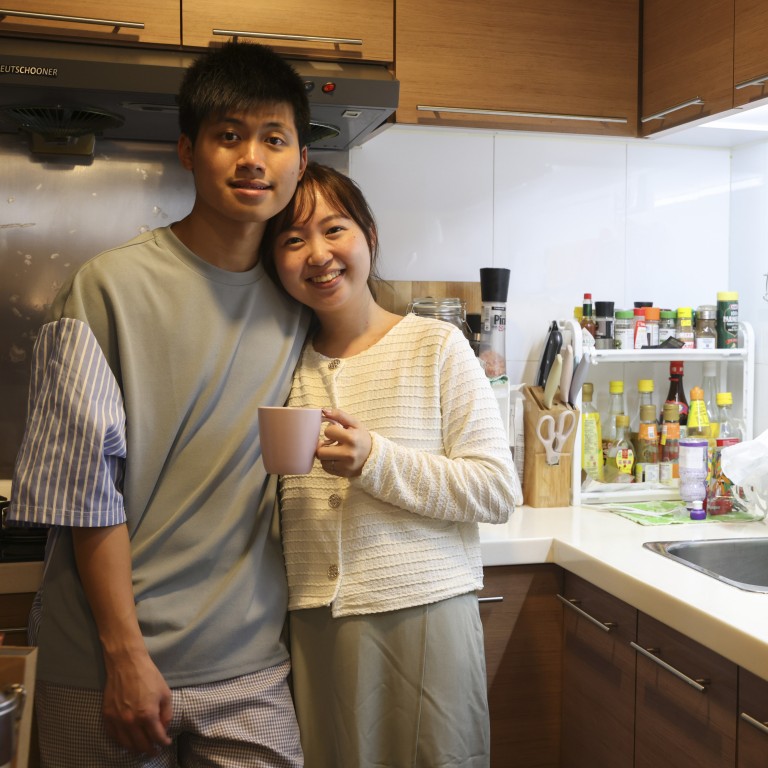
Hong Kong policy address 2023: how do investors, entrepreneurs, struggling families and newlyweds grade John Lee’s promises?
- Post dives into what the people most directly affected by the new policies – or lack of them – feel about the address
- On steps to boost birth rate, one newly married woman says: ‘They are only sweeteners that will last for a short time, but they will not help me with a responsibility that I will have for the rest of my life’
Ahead of the speech, analysts told the Post that residents had high expectations of Lee and that his “honeymoon” period was over. Did he deliver? Here the Post dives into what the people most directly affected by the new policies – or lack of them – feel about the address.
Property investors
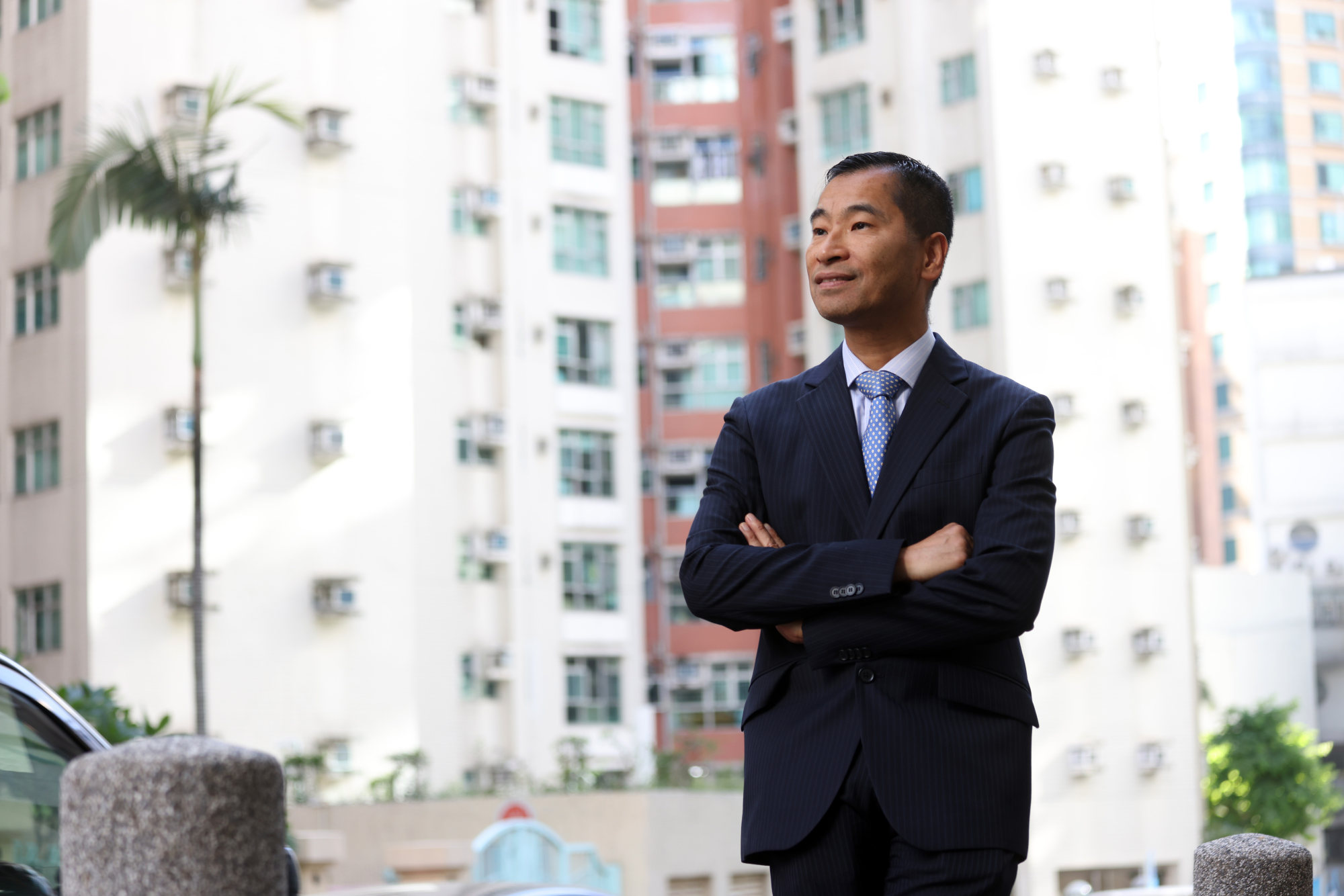
Veteran property investor Eddie Lam Yat-ming, who is in his fifties, has not bought or sold any flats since 2016 when the Hong Kong government increased the stamp duty to 15 per cent of the purchase price for buyers who already owned a home.
“There were some good deals,” he said. “I might be able to earn two or three times the purchase price. But I did not sell them … as I would then have to pay several million dollars for the tax when I bought a new one.”
He had hoped to buy new flats offered at a lower price in recent months, but decided against it because of the stamp duty, he added.
But after Lee’s policy address lifted the extra tax on people buying additional homes, Lam said he would “proactively and cautiously” consider buying property as he predicted an increase in demand for housing as more people from mainland China settled in Hong Kong in the coming years.
Lam added factors such as the introduction of fresh measures to attract talent to the city and 200,000 babies being born in Hong Kong to mainland parents between 2001 and 2021 could contribute to future demand.
“I am pretty positive about Hong Kong’s property outlook,” he said.
Can Hong Kong ease property measures without hurting first-time and local buyers?
Retiree Alvin Yeung*, in his sixties, said he was in no rush to buy a flat. Yeung is renting a home with his wife and 24-year-old son after he sold his 600 sq ft home in Sha Tin in February.
He said he planned to buy two flats in Hong Kong and rent them out after he moved to Britain in the future.
“I am pessimistic about the property market,” Yeung admitted.
He said the economic outlook was dire on the mainland and around the world.
“I will just wait until the price drops lower,” he added.
He said that considering the high interest rate it would be better to invest in a time deposit, which could offer a financial return of 4 per cent, rather than putting the money into property.
*Name changed at interviewee’s request.
Poor families
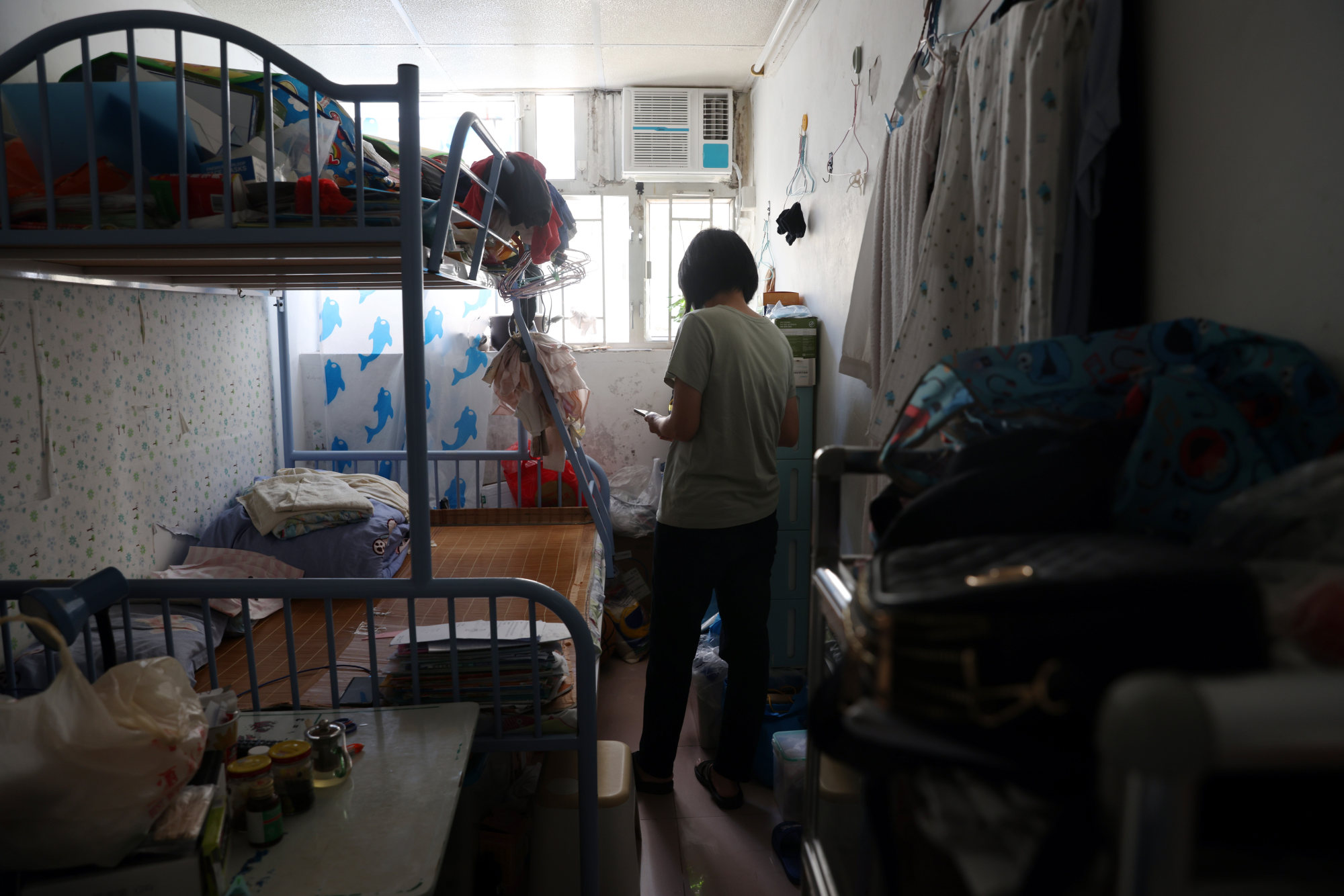
Living in a 100 sq ft subdivided flat, 53-year-old Coco Chan and her 12-year-old son have had to endure a pervasive odour emanating from their combined kitchen and toilet drainage system, which permeates their entire home.
The mother said their living conditions were substandard, with the rooftop home dark and stuffy. The flat owner had not offered to help fix the pipes, she lamented.
“I feel depressed living in this flat, but it is all about money. I have to pay more if I move to a better place,” she said.
The two-person family has been relying on Comprehensive Social Security Assistance, which offers a monthly allowance for those in need, to help pay their HK$4,500 (US$575) rent and other daily expenses of about HK$6,000.
Chan said costs such as her son’s lunch fees, new school uniforms and books, as he entered secondary school in September, had made the financial pressure worse and she could hardly save any money.
Hong Kong’s tiny shoebox flats a big problem; can policy address tackle it?
Lee last month pledged to solve the issue of subdivided flats, but his policy address on Wednesday only mentioned setting up a task force which would have 10 months to study defining minimum standards for tiny homes and propose measures to eradicate substandard ones. But Lee has yet to set a timeline for fully eliminating them.
Chan said she was hoping authorities would step up efforts to address poor living conditions, apart from just studying them, and increase financial support for low-income residents.
She also outlined what should be basic requirements: “At least the kitchen and the toilet should be separated … It is not a place for humans to live in.”
Innovators
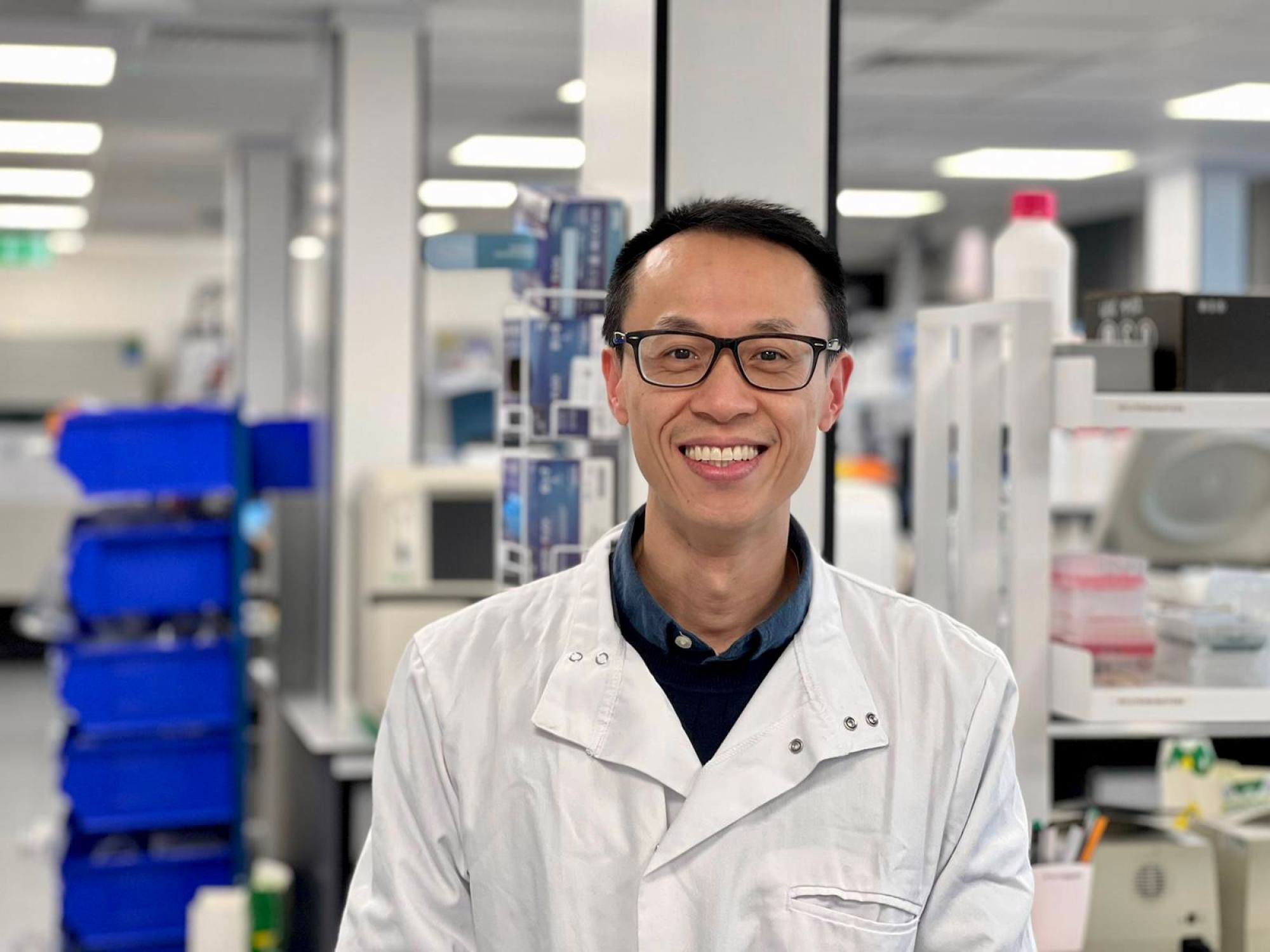
Lawrence Tam Chi-shing, a gene therapy researcher based in the United Kingdom, had considered launching a start-up in Hong Kong while working at the University of Oxford and Trinity College Dublin.
But the 41-year-old gave up on the idea as he felt securing funding and support would be difficult in the city. Instead, he joined a British start-up, which was eventually acquired by a pharmaceutical giant.
Compared with Britain, the Hong Kong government and local investors were less willing to back projects that required a long period of time to carry out research and faced a higher risk of failure, he said.
“Many biotech companies, including the projects that I was involved in, target rare eye diseases. These diseases do not have cures yet because of a lack of interest from big pharmaceutical firms,” he said.
“A cycle of translational research can take up to 15 years. Developing these types of treatments or cures involves a lot of trial and error. When the government or private sector invest a sum of money on this kind of research, the risks they face can be huge.”
30 firms to invest HK$30 billion in Hong Kong, ‘help spur city’s rise’ as I&T hub
Tam said such a risk-averse culture had made researchers hesitant to engage in work that could have a huge impact and eventually be used in clinical settings.
To attract international researchers, the government should support local biomedical talent first and take the lead in backing high-risk research, he argued.
“The mentality of the British and European governments is that these investments can be evergreen,” he said. “After the projects have taken their first step, the experience gained can help build the second, third generation and so on.”
Lee on Wednesday said the government would explore establishing a stand-alone statutory body to regulate medical products.
Hong Kong leader John Lee says cross-border tech hub will be reality by 2035
Tam said he agreed with the move as the city was lacking a body that could lead research efforts in drug development.
Lee also revealed that an institute would be set up to coordinate clinical trial efforts in the city and collaborate with Shenzhen authorities to conduct such research on the mainland.
Tam said collaboration would mean access to a larger sample size for research, which could help in luring overseas talent to the city.
“It is also important for the institute to link researchers up to clinical trial centres from other countries,” he said. “In the UK, we usually focus on the local market first and bridge our efforts to overseas markets as it can be more financially appealing.”
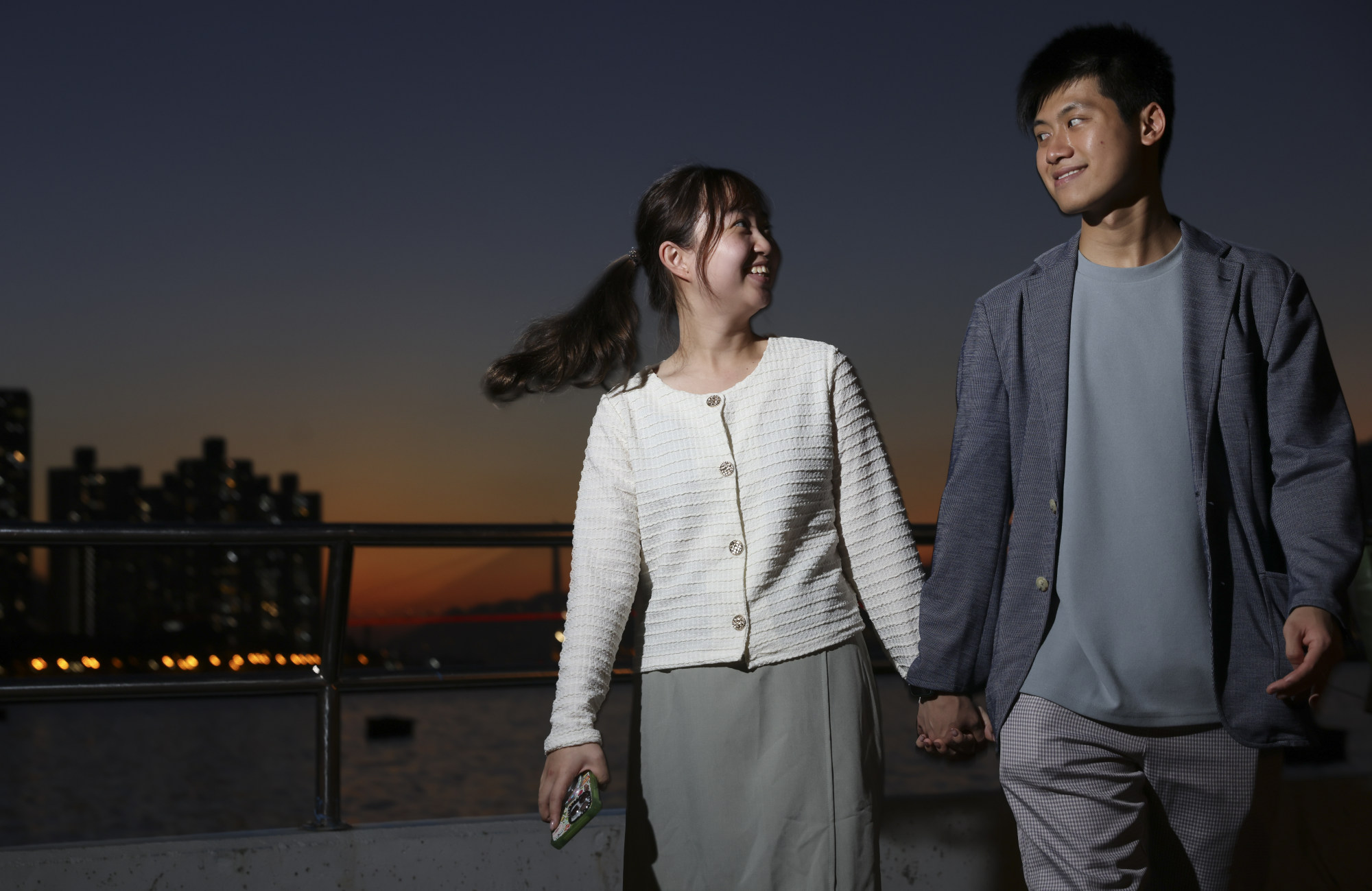
Prospective parents
Marco Tse Wah-ho and Michelle Lee Oi-yee married in July but have put off having children for now, even as Hong Kong’s leader promised a variety of sweeteners in his 2023 policy address to help boost the flagging birth rate.
“If the government really wants to encourage people to have children and to raise the birth rate, they should be thinking about how to help people plan for a family, which is how they can solve the burdens of raising a family, ” said Tse, a 28-year-old insurance agent.
Michelle Lee, a 27-year-old primary teacher, said: “They are only sweeteners that will last for a short time, but they will not help me with a responsibility that I will have for the rest of my life.”
What can Hong Kong do to reverse its low birth rate? We look at various proposals
City leader Lee on Wednesday said parents with newborns would be eligible for a HK$20,000 handout and would be prioritised when looking to buy subsidised flats.
But the couple do not qualify to buy subsidised government housing, as they earn about HK$8,000 more than the government’s threshold of HK$62,000 per month.
They also said they wanted to wait three to four years before having children to give themselves a chance to save first and spend time with each other.
On top of child-rearing costs, Tse and Lee were concerned about the everyday challenges of raising youngsters.
The pair said authorities should roll out a comprehensive policy package that supported first-time parents by addressing such issues as unaffordable housing, a stressful education environment and the city’s demanding work culture.

